If Irrfan could have been our finest professor of empirical philosophy, and Nawaz is our foremost poet of that space halfway between the gutter and the stars, then Jaideep Ahlawat has to be our greatest artist-scientist, asserts Sreehari Nair.
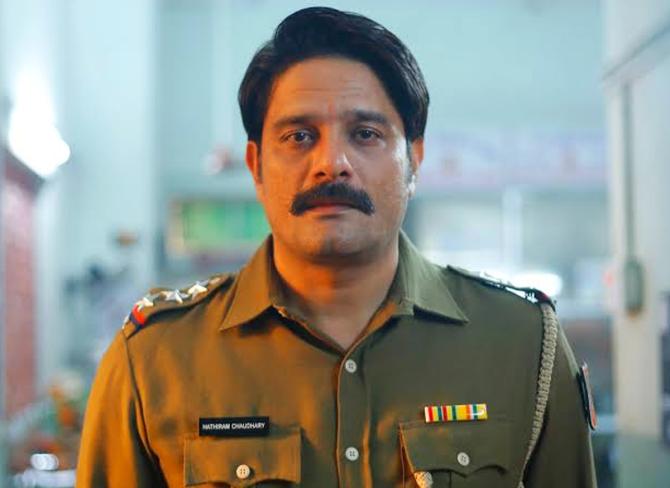
When you watch a scene of Jaideep Ahlawat talking on the phone, you don't for a second want him to get off the line.
That's saying a lot, and yet there's more to the appeal.
For when Ahlawat takes possession of a mobile handset, you also want to see how he pulls through the bland ringtone, you want to see how he stares at the screen while deciding whether or not to pick up, you want to catch the slightly tuned-out expression with which he opens a call, you want to feel the finger of authority or the thumb of relief that he uses to disconnect a call.
Jaideep Ahlawat talking on the phone is a thing of such persuasiveness and beauty that in one of Paatal Lok's many felt moments -- which has him receiving a piece of news so distressing that he repeats his 'hello' a second time, and in a tone that empties the salutation of its essential warmth -- you want to follow him as he takes off with the device still glued to his ear.
A lesser, more self-absorbed actor might demand that a phone conversation scene featuring him be shot in close-up, he might half-listen or drift about mentally, and thereby try to make his intensity or boredom the scene's central motif.
With Ahlawat, it doesn't matter if he's a puppeteer at the mouthpiece or a mere marionette, doesn't matter if he's delivering a straight speech, stumbling for the right word, or freezing in mid-sentence: You can be sure that he'll expand the range of the scene, and make even the person at the opposite end of the line vivid. And so, one after another, they all dial his number to collect their due -- anxious wives, pissed-off bosses, betrayed brothers, journalists looking for some nightly scoop, heartbroken friends on the verge of self-mockery, deceivers of our republic dressed up as terrorists or flag-waving patriots, and the various sordid levels of our bureaucracy.
The mobile conversation scene, minimal in its scale but dense in its scope, is a perfect microcosm of Jaideep Ahlawat's true strength.
Few Indian actors value screen time as much as he does, few can manipulate screen time so well as to make us meditate on the human needs and realities in communication.
I was, recently, thinking about Shreyas Talpade, and how he's such a sincere, committed actor, but with one serious flaw eroding his talent: you get the sensation that Talpade starts acting at the very instant that the Director yells 'Action'. (If there's an occupational hazard to continuously appearing in Rohit Shetty's movies, it's this!).
Now contrast the aforementioned approach with Ahlawat's, who seems to slow things down, not with an intention of dodging the audience, but so that as audience we can build ourselves up to a scenario, to the beautiful complexities at hand.
Yes, the brief wondrous career of this pockmarked genius presents an anthology of judgments so precisely delivered that it would put even a veteran to shame.
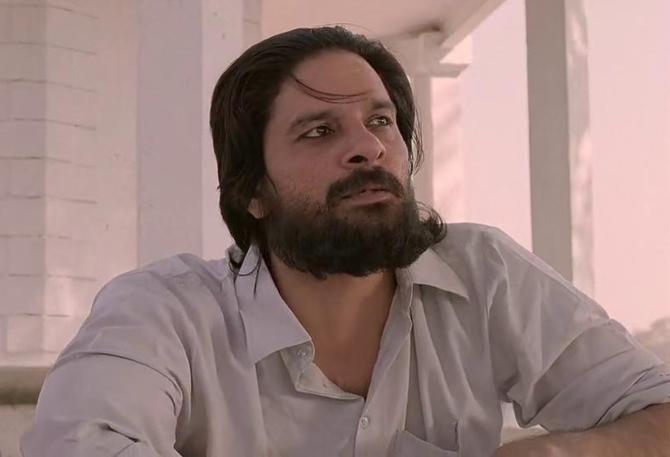
Jaideep Ahlawat's internal stopwatch seems to know exactly how long it takes for the dignity of an underperforming police officer to be restored after an official warning.
He takes us through this process of restoration, keeps us waiting like a sociologist in the wings, before rolling out the clincher, which turns out to be something as simple as a nod of the head -- and when it arrives, you realise it's all you need.
The internal stopwatch is at work again in the opening scene of his section in Lust Stories, where he keeps tapping his big toe and counting the waves, as his best friend's wife puts on for him a swimsuit show straight out of every damsel-in-distress sequence ever filmed.
He is assessing her act, but also measuring his own dubious voyage thus far, and at last looks away smiling, as if duly applauding both.
Next time you watch Jaideep Ahlawat in action, keep an eye on how he bends moments to his will; how he adds a little seasoning of countenance or gesture that allows him to cut a scene down to his outline, how he then spreads the energy concentrated on him over to everything that makes up the scene, how he gets his co-stars and even the material things that surround him to buzz and vibrate inside the shadow cast by the Jaideep Ahlawat Internal Stopwatch.
I have seen mediocre actors turn into alert performers in his presence, I swear I have seen tabletop accessories and modest knick-knacks acquire a consciousness of their own.
Simply put, it's comforting to watch the man go about his job. I don't know about you, but I call it the next thing to yoga.
But here's a heartening coda to the theory I am blundering out.
This ability to make the most of his screen time does not make Ahlawat a cold technician like, say, Neeraj Kabi, who is also a very skilful actor, but whose control over his craft often puts him beyond our emotional reach.
Ahlawat's control is one that helps you leap into the particular states of his characters.
His craft takes you right inside a beating heart, gives you a hero who is neither hyper-masculine nor over-sensitive, just a hero who is testing the waters, and telling us with a grin that we are, all of us, swimming in the same river of becoming.
For the purpose of illustration then, let us examine closely one of those hearts, and its special intonations.
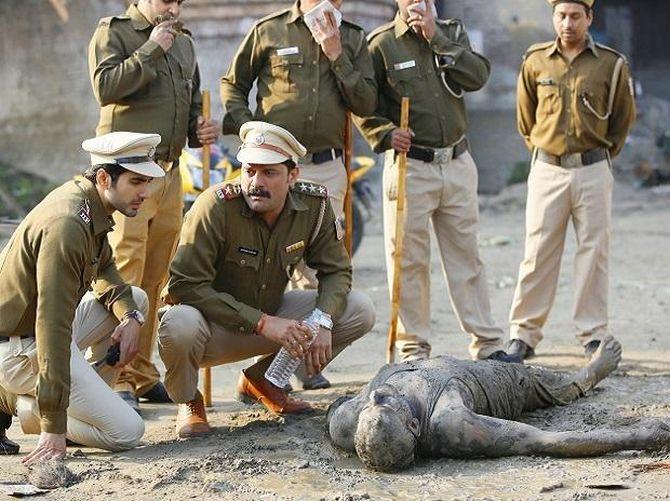
In the opening scene of Paatal Lok, when Hathi Ram Chaudhary is drawing a fatalistic map of the netherworld through which he'll soon journey, he shows the presence of mind to scrape the dirt off his shoes and duck unexpected obstructions -- conveying to us in effect that the narrative, for all its hopeless designs, could still spin off into interesting little tangents.
When he runs into a set of subordinates passing anti-Muslim slurs, and has to make a point about it, all Chaudhary does is wear his police cap using both his hands.
The extra effort he expends tells us how crossed he is, and yet he keeps his revulsion well within the boundaries of professional decorum.
When Chaudhary, hounded by the government, by the media, by his superiors, chases after suspicious-looking men through the winding roads and alleyways of Chitrakoot, the police officer pounds the cobblestones while clutching tightly at his shoulder bag.
At this point, he's not in the conventional game of outwitting his enemies; on the contrary, an understanding that both he and his enemies are locked in the same graceless pursuit seems to serve as his vector.
When, in the middle of an interrogation, he pokes the sweater-clad tummy of glum-faced bellboy, it doesn't feel like a taunt but a note of reassurance -- a reassurance that matters are never as hopeless as we think; that there's more good than bad in the sum total of us and our workings.
Nawazuddin and Irrfan also inspired in us this very brand of optimism, one that's arrived at after negotiating your way through the grease and grime of life.
The critical difference between the two actors was that Irrfan wanted his characters' feelings to be rationalised in his head before he brought them alive on screen, while Nawazuddin tends to give his best performances when there's freedom to ignore the diktats of his frontal lobe and work things purely out of his intuitions, his imagination, and his psychic energy.
Jaideep Ahlawat triangulates Irrfan and Nawaz, in that he constantly finds ways to rationalise his unconscious.
If Irrfan could have been our finest professor of empirical philosophy, and Nawaz is our foremost poet of that space halfway between the gutter and the stars, then Ahlawat has to be our greatest artist-scientist.
I have often wondered: What an interesting challenge it must be, being Jaideep Ahlawat in a country like ours; for Indians dream about actors who get star-struck on themselves while identifying with performers who are generous by nature. An acrobatic young actor with a chiselled body, who specialises in making himself the subject of every frame, may stoke the superheated fantasies of an Indian audience.
But when it comes to claiming as their own, the same audience might pick the slouch-shouldered and jagged-toothed Ahlawat, who grew up wishing for a slice of that other Indian dream-life that promises a comparable blend of heroism, violence and ecstasy. Yes, he's the man the Indian Army once rejected, and he can now start a minor war at the bottom of a long shot.
Those with an eye for things beyond the immediate horizon may recall catching a glimpse of him in Imtiaz Ali's Rockstar: As the monkey-cap wearing elder brother who smacked Ranbir Kapoor out of shape on the verandah, he gave the movie a charge it could have done with all along.
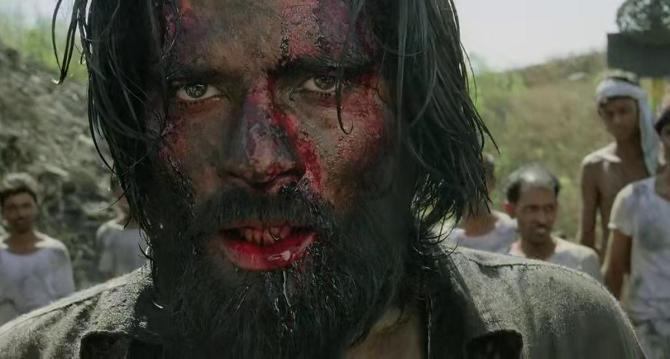
Later, in Meeruthiya Gangsters, you noticed that he could sit back and add invaluable texturing to long takes.
In that film, centred on the clumsy exploits of a fouled-up gang, you saw him mostly in the background, devouring pani puris by the plates, spilling pricey liquors with abandon, or playing boyish games of flirtation with dames who nudged him back.
He emerged as the natural leader of that gang, not by force but by faith, by how he permitted his preferred electronic equipment to change hands, by how he then dictated a mobile phone conversation while happily sucking on a hookah, making gurgling noises, and laughing through the smoke.
If he was equally hysterical as the lout with blank eyeballs in Commando, as the starchy CBI Officer in Gabbar Is Back ordering his minions around in Haryanvi-flavoured English, and as the henchman smiling the all-knowing smile in Raees, it was because those characters were anointed with self-love and self-love alone.
In India, your discomfort about loving yourself on screen is taken as a sign that you are not star material (This is how far the average critical mind in this country will dare to go).
As I see it, if a talented actor can be nothing more than 'gloriously hammy' when asked to stare at the camera and crack whistle-worthy dialogues, there's a good chance that his instinct is to think about a scene in its totality, and not just in terms of how it can function as a podium for his ego.
In Jaideep Ahlawat's case, this is utterly true; and in a film like Gangs of Wasseypur, where the camera followed him instead of him following it, you saw him set the tone for a host of memorable performances that came tugging at his kurta.
There, a gallery of great actors jostled for space, and his Shahid Khan was the first to stake out the stage -- animating swear words with a peculiar throw of his gullet; allowing the final syllables of threats to stay alive in his mouth long after the sentences have played out; searching for the smallest signs of rebellion to suppress and for the humblest of sanctuaries in which to rest his curiosity.
The two parts of Wasseypur taken together, his is the only death you mourn.
To this day, it moves me to watch that shot of him feeling his blood before going down.
And yet, you are so on his side that you don't necessarily have to wait for the bullets to get him; it hurts just to see Shahid Khan operating below full capacity.
A look that he exchanges with a worker he is trying to silence, speaks of the hired gun's wasted potential; it's almost like observing a Marxist who we know has turned to greed for salvation.
That, then, is the secret recipe!
With Ahlawat at the helm, you get to experience the delight in shared time, sure, but the inevitable sadness of time passing is there for you to savour as well. And it's this sweet sadness he evokes that has helped plug the gaps in many a conception.
The suave smirk, so palpable in the works of a writer like Sudip Sharma, or a writer-director like Dibakar Banerjee, is transformed into something human by this very Haryanvi actor, and his ability to open a small window into those chapters and back-stories not explicitly diagrammed by the script.
For instance, by familiarising yourself with the many variations in speech that Hathi Ram Chaudhary employs when speaking to his domestic equal (Gul Panag, in a transcendent performance as the resilient Mrs Chaudhary, who swears through her gnashed teeth), you come to understand that you're being treated to something more than just a plain battle-of-the-sexes.
It dawns on you that a fresh marital theme is being perfected in those scenes.
A love story of a petulant man and his nagging wife, who have built their relationship on taunts, half-shouts and unexpected sighs -- now how wonderful is that?
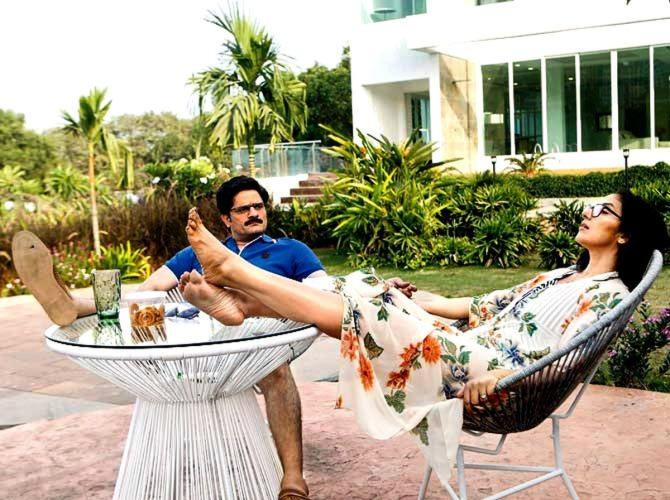
When Sudhir of Lust Stories watches his own interview on YouTube, his face muscles scrunched up, the affectations in the video reflected in his glasses, it suggests the tragic tale of a modern-day Narcissus; a Narcissus who, in his attempt to overcome his humble beginnings and gain entry into a whole new status sphere typified by community clubs and social dinners, ended up nursing an identity crisis.
Ahlawat, with his beaver-like skills, can construct an edifice of time so intricate that you never lose sight of his characters; even when he's reduced to a blur, you see him clearly, holding up one end of the scene.
He's present even in the empty stretches; and especially in bogus narratives, where each action or word is slanted toward the next big plot twist, he becomes the breathing comma.
In his shoddy section of Ajeeb Dastans, where everyone else seems content in dishing out punchlines, he draws you in by breaking a piece of Socratic argument -- all with a slight twist of the jaw, and a wobbly neck that feels like it's being drained of cultural pride.
Yes, Jaideep Ahlawat frequently slows things down, but these interludes are anything but portraits of nothingness; in point of fact, they are subtle reminders that every minute a millions stars are indeed born and do burn out, countless flowers wilt as well as explode into bloom, and hundreds and thousands of eager smiles either hit pay dirt or rock bottom.
Francois Truffaut had on one occasion talked about the difference between 'real time' and 'film time', and about the importance of compressing life when using it as the basis for movies.
Watching Ahlawat weave his magic, you are brought within close range of a hero who may be belatedly questioning the French New Wave master.
He's a hero who has more feeling than a movie's run-time can possibly contain.
Yes, for all his economy and grace, Jaideep Ahlawat's is not the art of contraction, but of overflow. And just like that, when in scenes of high tension he starts to fly, you may discover that he has scurried ahead and is waiting patiently for you to catch up.
As Jaggi, the lawyer blessed with a conman's charm, he flicks on a dull show, Bloody Brothers, and sets it whirring.
In a scene of Jaggi formulating a devious plan that'll help save his hide, he maintains an open smile throughout, visualising the steps in his head, using his hands like an evangelist at a revival meeting, building each line on top of the line that preceded it, and bringing to the monologue the spirit of great improvisation and the air of a well-thought-out legal brief.
The scene could have been macho and showy and altogether too much, but Ahlawat ensures that it's lined with an odd appreciation that comes of something being nearly lost, pulled back from the brink. And if all that weren't enough, he tops the scene with a good old toodle-oo, in the manner of a Parisian gentleman.
His turn as Jaggi gives the lie to our mass movies, which repeatedly present variations on the hero-as-a-crook theme, but then bring up the hackneyed Robin Hood idea, or tales of the hero's deprived childhood, or the I-put-my-country-above-everything-else code he lives by, or something similarly cutesy to round off his actions.
Only Jaideep Ahlawat, among the current lot of Indian actors, can play the crook as an honest debonair, twirling his fingers and dancing through his schemes, spinning high in the air but always landing on his feet.
What's more, he doesn't have to be corseted in tried-and-tested character arcs: the man-child who comes of age; the sweet-souled man whose silent sacrifices are unloaded upon us as postscripts.
Ahlawat's expert manipulation of screen time provides us with emotional revelations, but they don't come at the cost of the hero acquiring something as grand as a changed conscience or identity.
He doesn't guide you to the stratosphere of sudden enlightenment, merely to that small hillock in his neighbourhood from where you see things a bit more clearly.
This is why you root for him even when he's playing the worst best friend possible, a not-so-idealistic husband, or a father with questionable methods.
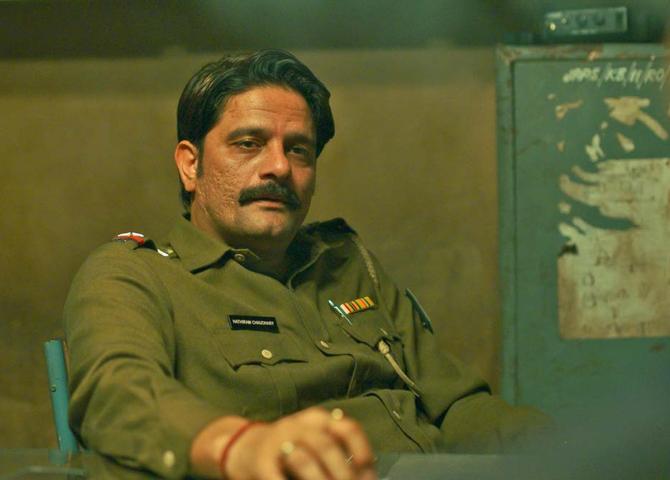
A breathless stretch in Paatal Lok commences with Hathi Ram Chaudhary roughing up his wife, and then taking down his son's gangster-tormentors, from the foot soldiers to the kingpin himself, in sequence.
Slap by slap, and crotch-punch by crotch-punch, he razes an entire fortress in East Delhi, and knits a comfy nest for his boy, who looks at his erstwhile-loser father with astonishment.
The stretch may have given many an audience member the kind of pleasure that Sunny Deol's films used to give in the past; but make no mistake, this one is closer in its inwardness to the ending of The Bicycle Thief than, say, Gadar.
At this point, the chasm between Jaideep Ahlawat and his contemporaries becomes ever more obvious to us: Actors speak to the consciousness of a nation, either as forces pitted against the society or as explorers of their inner selves; for Ahlawat, however, the external pressures he experiences are occasions to show us the strife within.
So, after the fleeting violence begins a blistering ride in a rickshaw, during which Hathi Ram Chaudhary, who is growing disillusioned with the ways of the world, tries to express in an incoherent fashion the cathartic power of the last fistfight.
He then gets off the rickshaw, pays the driver, turns around, and his wife plants on his cheek the retaliatory slap that she had been preserving as an itch on her palm.
And how does Ahlawat, the official timekeeper of beating hearts, take it? He doesn't allow the stunned look on Hathi Ram Chaudhary's face to dominate the moment.
Instead, he accepts the slap, accepts it as if it were the first note in a romantic symphony, which had stopped playing years ago.
When she ends his breathless march under the moon, you think Mrs. Chaudhary has made the ultimate declaration of love. But Mr Chaudhary goes one up on her. He turns back the clock.
Feature Presentation: Rajesh Alva/Rediff.com



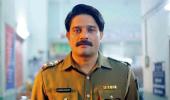







 © 2025
© 2025